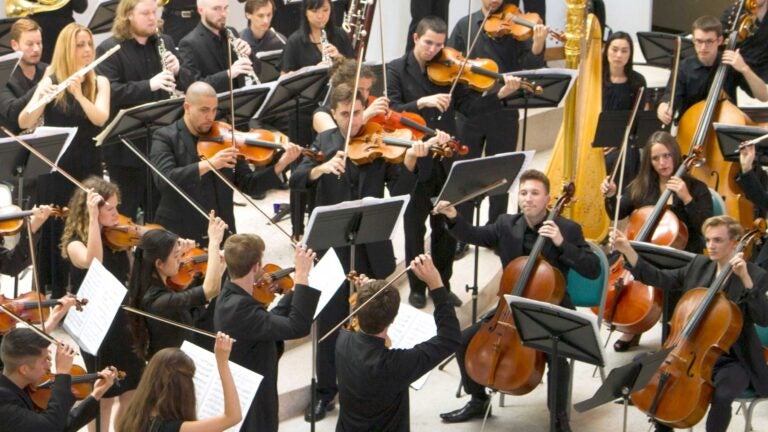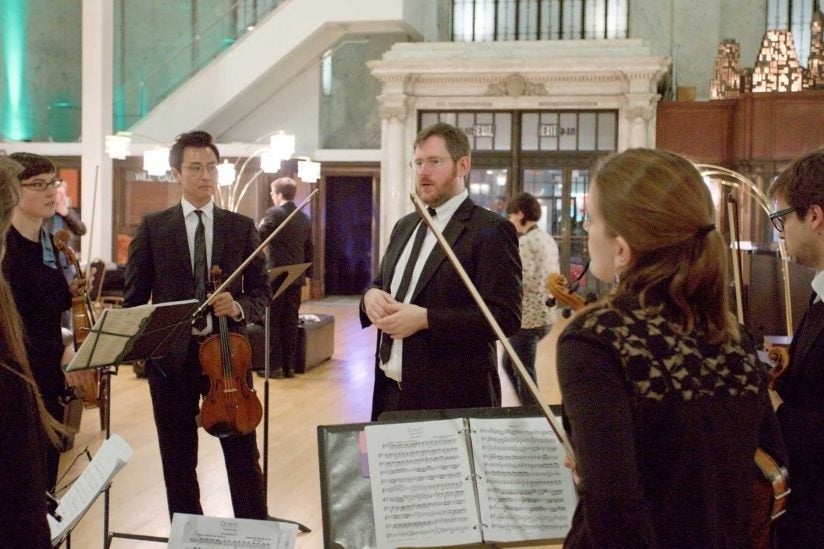
An orchestra with no conductor is music to USC entrepreneur’s ears
USC Thornton alum gathers musicians who perform across L.A. as members of the Kaleidoscope Chamber Orchestra
It’s 10 p.m. somewhere in Los Angeles as an orchestra performs the work of a contemporary composer.
But there’s no conductor in sight.
Welcome to a performance by the Kaleidoscope Chamber Orchestra, a group that takes an atypical approach to music. It was founded by USC Thornton School of Music alumnus Benjamin Mitchell ’17.
Kaleidoscope features some of the best musicians in town performing a wide range of orchestral pieces. In addition to performing in untraditional locations, like Union Station, the orchestra puts on free concerts in schools, hospitals, homeless shelters and retirement communities.

The concerts operate as a pay-what-you-can-afford model, allowing music lovers to decide how much they can and want to pay.
“Our model doesn’t pose a financial barrier for anyone,” Mitchell said, “and that can lead to the audience being more diverse and bring in people who normally don’t go to classical concerts.”
From musician to entrepreneur
Kaleidoscope searches for diverse and inclusive programming. For the past three years, the organization has called for composers from around the world to submit compositions that would be played by the orchestra.
“This past summer, we received almost 1,800 applications from composers in over 50 countries,” Mitchell said. “I’m really excited about what we’re doing this year. It’s much more diverse than any other orchestra I’ve seen.”
Mitchell has been a performing clarinetist most of his life. He holds three graduate degrees in clarinet, performs with symphonies and orchestras around the world, and collaborates with an impressive roster of composers. However, in 2014, he took on the role of entrepreneur when he decided to found the orchestra.
“It’s funny, I didn’t see it coming at all,” Mitchell said of his transition to entrepreneur. “I just fell into it out of necessity. Through all my other school programs, I was always very driven to be a performer and play at a high level. I still am, but now I’m balancing that with running Kaleidoscope.”
Mitchell organized Kaleidoscope’s first concerts with no budget.
We only got started because there were so many really great and generous musicians who wanted to be a part of this.
Benjamin Mitchell
“We only got started because there were so many really great and generous musicians who wanted to be a part of this,” he said.
Since Mitchell’s background is in performance, he had to learn the ins and outs of entrepreneurship on the job. Shortly after Kaleidoscope completed its first round of concerts, Mitchell raised over $30,000 on Kickstarter to carry the organization to the end of its first season, and he wasn’t sure if they’d make it after their first season.
Arts leadership
About a year after founding Kaleidoscope, Mitchell was introduced to Kenneth Foster, director of the Arts Leadership program at the USC Thornton School of Music.
“Benjamin is a terrific example of the type of students we draw to Arts Leadership,” Foster said. “He is passionate about his art and driven by his desire to make a difference in the world. You can see he is willing, even eager, to challenge some of our basic assumptions about how music is performed and presented. These are the characteristics of the arts leaders of tomorrow and, as Benjamin points out, the program meets their need to follow their own dreams.”
The Arts Leadership curriculum is designed for arts administrators and cultural entrepreneurs who are looking to take their artistic vision or project to the next level. The program is a rigorous incubator for big ideas with highly individualized instruction to meet each student’s unique needs.
Shortly before Mitchell graduated from the Arts Leadership program this year, Kaleidoscope ran another Kickstarter campaign and raised $73,000. Kaleidoscope also recently received a gift of $250,000, allowing Mitchell to expand its programing, raise the pay for musicians and transition from an all-volunteer group to a small paid staff.
Now in its fourth season, the orchestra will be presenting more than 20 premieres, a steep number for any orchestra, let alone one with Kaleidoscope’s budget. Mitchell hopes to continue to reach new and diverse audiences and lead the ensemble toward mainstream success.
“I think there’s a very good chance we’ll be around in five, and even 50 years from now,” he said. “We’re still working to get to the next level with the organization, but with everything happening in the world today, we need great art more than ever.”
Watch and listen to Kaleidoscope perform Mahler’s Symphony No. 4
